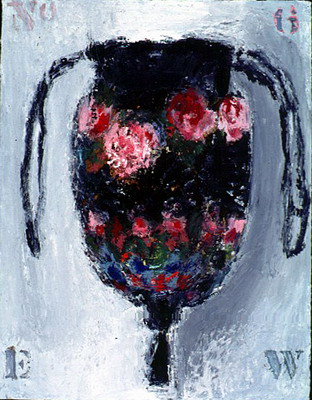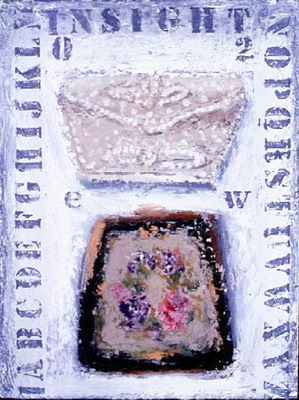 May 06
May 06
Leaving Homeland
by Sara Sherbill
p. 2 of 2
Whether I was conscious of it or not, I now see that I was looking for another model of what it meant to be a Jewish woman when I moved to Israel. I don’t know if I found it in Jerusalem, but I did find a lot of lost pieces of myself. I was inspired by the Israeli women I knew and saw around me. They had a certain confidence not necessarily because of looks, wealth or achievement, but simply - it seemed to me - from the very fact of being. Israel has a myriad of fractured and often warring subcultures, but I saw this trend across the board: in the well-to-do young women from Tel Aviv in their hyper-hip clothes, in the modestly dressed ultra-Orthodox women from Meah She’arim,  in the faithful earthiness of “settler” women in their flowing, colorful scarves and wrap-around skirts. The women I met, or saw walking down the street, seemed to have something their American counterparts do not. A sense of self rooted in a sense of place – and a knowledge of themselves borne of faith, in God or in themselves. They seemed to trust themselves in a way that I was only just learning to. Seeing them made me feel I was in the right place - that the lessons I needed to learn were the lessons being taught, and that I could learn them just by looking, by watching, by sitting by the Western Wall and daydreaming. From the women of the land of Israel I learned something about how to be alive, even amidst death.
in the faithful earthiness of “settler” women in their flowing, colorful scarves and wrap-around skirts. The women I met, or saw walking down the street, seemed to have something their American counterparts do not. A sense of self rooted in a sense of place – and a knowledge of themselves borne of faith, in God or in themselves. They seemed to trust themselves in a way that I was only just learning to. Seeing them made me feel I was in the right place - that the lessons I needed to learn were the lessons being taught, and that I could learn them just by looking, by watching, by sitting by the Western Wall and daydreaming. From the women of the land of Israel I learned something about how to be alive, even amidst death.
After living in Israel for the past seven years, I cannot idealize it. It is, in so many ways, a hurting, broken society that needs to rebuild from within and without. Still, living there made me, if not a holier person, a wholer one. I never became “more religious” or “more political,” as I think some of my friends and family expected I might. I never developed Jerusalem Syndrome and awoke in the morning thinking I was King David or Jesus (or for that matter, Bathsheba or Mary). And I never imagined we were living in messianic times. Rather, I found a job as an editor and writer at a newspaper, I moved apartments. I made some friends, and when they moved back to the States I made other friends. I got a promotion, the Second Intifada broke out and I heard helicopters overhead while sitting on my porch. The Second Intifada continued and I passed by bombed-out places that I had eaten lunch at the day before, I questioned myself for living there, and felt I was dancing between the raindrops. I grew restless at my job, I got married, I got divorced, my washing machine broke (twice) and the whole bathroom flooded.
Most American Jews who move to Israel don’t do so out of necessity. They’re not fleeing war or persecution or looking for better opportunities for their children. They are idealists to varying degrees: fervent believers who think Israel is the only plot of land on earth where a Jew should live or spiritual seekers looking to explore the alleyways and study houses of Jerusalem, where shopkeepers moonlight as mystics, or self-described atheists, who believe in this strange, mid-century social experiment of building a multicultural society in the sand. Some want to move as far away as they can from their families. Maybe they're just a little bit crazy, because who else would move halfway across the world to a place that is besieged on all sides, where the language will never be your native tongue, where you will always be an outsider?
The longer I lived in Israel, the more I came to feel an odd mix of belonging and not-belonging. After years of living there, I felt both utterly at home and foreign. Maybe because it was never my goal to fully acculturate into Israeli society, I never did. Most of my friends were Americans and many of the friends I made, even those who planned on staying forever, left. I spoke English at home at work, and even with the Israelis I knew. I did have American friends who immediately adopted the Israeli accent, the Israeli boyfriend, and that particular brand of Israeli impatience - but none of those things ever felt comfortable to me. I took private lessons in Hebrew and went through a period where I forced myself to read a Hebrew newspaper once a week. But I knew the language would never be my own. I was happy in my little English-speaking corner of Jerusalem. But eventually, a part of me came to feel trapped. My world was small and circumscribed, and I started to wonder about all the parts of me that were going unexplored. I hadn’t changed jobs in seven years because good English-speaking jobs are in short supply. I never found a group of writers with whom I could really share my work. I grew tired of everyone around me always talking about God and His books.
So many Americans come to Israel to do their seeking, but I was tired of seeking. I wanted to talk about other things. Living in Israel, I always felt I was part of Jewish history unfolding, but eventually I came to see I wanted to feel my own life unfolding. There was a brief time – maybe a few months - when I thought living in Jerusalem was a panacea. Like all those of various faiths coming on pilgrimage throughout the centuries, I believed I had touched upon something magical and eternal  by being there. I thought I had stepped into that fabled, fantastic reality just beyond the looking glass and that I could claim it for myself. It turned out that living in Jerusalem was, in many ways, a heightened existence, but that didn’t immunize me from the vagaries of life.
by being there. I thought I had stepped into that fabled, fantastic reality just beyond the looking glass and that I could claim it for myself. It turned out that living in Jerusalem was, in many ways, a heightened existence, but that didn’t immunize me from the vagaries of life.
There is no one reason I decided to move back to the States. I cannot exactly explain it to myself even, except to say that I felt I had come to the end of one road of my life. I had been married in the hills surrounding Jerusalem, I had worked in journalism in one of the most heated and volatile times in recent memory, riding the crest of Oslo and its shattered aftermath. I had lived out as much as I could live out there. After almost a decade of living in Jerusalem, I felt I had exhausted its wonders, at least for now.
Now I am back in the place where I grew up, the place where the language is my own, and where my childhood friends are living their lives. I am back in the place where my aunts and uncles and cousins live, where I run into old college classmates on the street. Some of my friends have bought houses or cars or given birth while I was away. At night, when I lie in my bed in my apartment in the city, I close my eyes and remember an entire other life, one where I spent Friday afternoons picking out mangoes and strawberries and oranges in the shuk, where powdered-sugar doughnuts lined bakery windows at Hanukka, and the whole country went camping during Passover. I remember walking home from work as dusk set in on summer nights above the walls of the Old City. There is this other life, just shimmering there. This story I am telling myself is still in the middle of being told. It feels like there are possibilities all around me, even if I am not fully home.








